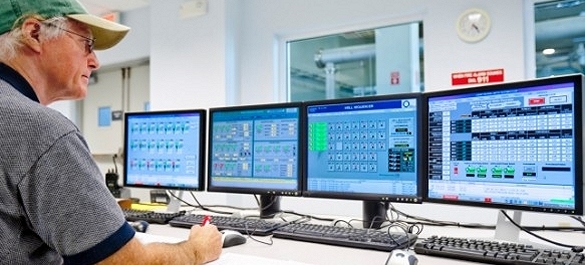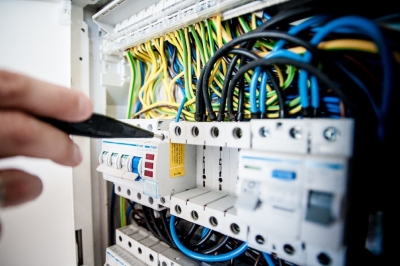Manufacturing Training for Maintenance:
- Home >
- articles >
- maintenance-management >
- manufacturing training for maintenance
Developing a Manufacturing Training Program for Maintenance
When searching online to learn more about manufacturing training, most focus primarily on manufacturer operator training with little or no mention of maintenance training for manufacturing. So, this article focuses on manufacturing training for maintenance.
In the world of manufacturing, production, efficiency, and quality control frequently take center stage. These are undoubtedly crucial aspects, but there's another element that often goes unnoticed - maintenance. Maintenance in a manufacturing setting is not merely about fixing things when they break. It's about preventative measures, ensuring smooth operations, and ultimately, contributing to the overall efficiency and productivity of the manufacturing process.

However, maintenance doesn't just happen. It requires a specific set of skills and knowledge, which is where manufacturing maintenance training comes into play. This training is not just about teaching maintenance staff how to fix machinery. It's about understanding the machinery, knowing how to prevent issues, and being able to troubleshoot problems quickly and efficiently when they do occur.
Use formal procedures, safe systems of work, technical authority for changes on each brand of rotating machine, and rotating machine knowledgeable engineers to protect integrity. Modifications that result in changes to drawings and other relevant rotating machine documentation need to be reflected in those documents, and the people trained, or else the rotating machine will be operated or maintained incorrectly. A plant needs procedures for checking the integrity of control systems and computer software, document management, and changes recorded and authorized. (Especially the commonly overlooked program changes for both the machine's CNC controller and PLC controller) Audit trail demonstrated!
Automation control training plays a pivotal role in modern training frameworks, given the surge in sophistication and prevalence of manufacturing mechanisms. This type of training ensures that maintenance personnel are equipped with the essential know-how and skills to operate and manage these complex systems. The ultimate goal is to ensure seamless operation, minimize system interruptions, and enhance overall productivity. In the next paragraphs, we will delve deeper into the importance of factory training and maintenance in manufacturing, the need for specific training, and how to create a successful manufacturing training program for maintenance. We will also look at some successful case studies and discuss the future of instructional courses for maintenance industrial settings. Whether you're a factory manager looking to improve your maintenance procedures or someone considering a career in manufacturing maintenance, this article is for you.
The Importance of Maintenance in Manufacturing
Maintenance in manufacturing is a critical aspect that often goes unnoticed but plays a significant role in the overall productivity and efficiency of a factory. Here are some of the most important aspects that highlight the importance of maintenance in manufacturing:
- Preventive Measures: Regular maintenance helps identify potential issues before they become significant problems. This proactive approach can prevent costly downtime and keep production running smoothly.
- Efficiency and Productivity: Well-maintained machinery operates at its best, ensuring maximum efficiency and productivity. Regular maintenance can also extend the lifespan of the equipment, reducing the need for costly replacements.
- Safety: Regular maintenance checks can identify safety hazards, such as worn-out parts or malfunctioning safety features. This can prevent accidents and ensure a safe working environment for employees.
- Quality Control: Consistent maintenance ensures that machinery operates as intended, which is crucial for maintaining product quality. Any deviation in machine performance can affect the quality of the products being manufactured.
- Cost Savings: While maintenance does require an upfront investment, it can lead to significant cost savings in the long run. This is because it can prevent expensive breakdowns, extend equipment life, and improve efficiency.
In conclusion, maintenance in manufacturing is not just about fixing things when they break. And therefore, the maintenance part of factory training is a proactive approach that contributes to the overall efficiency, productivity, safety, and cost-effectiveness of the manufacturing process.
Unpacking the Necessity of Manufacturing Maintenance Training
Having underscored the significance of maintenance in the manufacturing sector, it's crucial to dig deeper into the elements that make it effective. Central to this is the concept of manufacturing maintenance training, a specialized form of education that equips maintenance personnel with the skills and knowledge they need to excel in their roles.
Manufacturing maintenance training goes beyond the rudimentary understanding of machinery repair and factory training. It's a holistic approach that imparts a thorough comprehension of the machinery, its functioning, and the potential issues that could arise. This comprehensive knowledge base empowers maintenance staff to preempt problems and implement effective troubleshooting strategies when issues do arise.
A pivotal part of this kind of training is automation control training. With the advent of automation in manufacturing processes, the responsibilities of maintenance staff have expanded. They're no longer solely tasked with machinery repair - they're now the custodians of intricate automated systems. This shift necessitates a new skill set and a deeper level of knowledge, which can be attained through targeted automation training for manufacturer’s employees.
Automation control training equips maintenance staff with the expertise they need to ensure the smooth operation of these systems. It enables them to monitor the systems effectively, identify potential issues early, and troubleshoot problems swiftly and efficiently. This training is instrumental in minimizing downtime, enhancing productivity, and prolonging the lifespan of automated systems.

We will now investigate further into the role of automation control training in manufacturing maintenance and explore why it's an indispensable component of a comprehensive manufacturing maintenance training program.
The Role of Automation Control Training in Manufacturing Maintenance
With the rise in automation within industrial operations, the responsibilities of maintenance staff are undergoing a transformation. They are now responsible for maintaining complex automated systems that continuously grow in complexity. This shift necessitates a continuous learning of new skills and knowledge, which can be acquired through automation control training. Here are some of the key aspects that highlight the importance of automation control training in manufacturing maintenance:
- Understanding Automated Systems: Automation control training provides maintenance staff with a comprehensive understanding of automated systems. This includes how they operate, potential issues, and how to troubleshoot them effectively.
- Preventive Maintenance: With the right training, maintenance staff can monitor automated systems, identify potential problems before they occur, and take preventive measures. This also increases the importance of having an up-to-date electrical PM program. This proactive approach can reduce downtime and keep production running smoothly.
- Efficient Troubleshooting: When issues do occur, trained staff can troubleshoot them quickly and efficiently. With the proper PLC training, maintenance staff will learn how to use the automation software to reduce troubleshooting to a fraction of the time previously spent. This can minimize the impact on production and ensure that the systems are back up and running as soon as possible.
- Safety: Automated systems can pose unique safety risks. Automation control training can help maintenance staff identify these risks and take appropriate measures to ensure a safe working environment.
- Future-Proofing: As technology continues to evolve, the importance of automation control training will only increase. By investing in this training now, manufacturers can future-proof their operations and ensure that their maintenance staff are equipped to handle the challenges of tomorrow.
Essential Aspects of Training for Maintenance in a Manufacturing Environment
Creating a manufacturing training for maintenance is a task that requires thoughtful planning and a comprehensive approach. The program should encompass all facets of maintenance, ranging from the rudimentary operation of machinery to the complexities of automation control.
At the foundation of the training, there should be a focus on basic machinery operation. This involves teaching maintenance staff how to operate the machinery, understand the functions of different parts, use them correctly, and identify potential issues. This foundational knowledge is crucial for the effective maintenance of machinery.
Building on this foundation, the factory training should then delve into preventive maintenance. This involves teaching maintenance staff how to conduct regular checks, identify potential problems before they escalate into significant issues, understand the signs of wear and tear, monitor machine performance, and maintain machinery to prevent breakdowns.
The next layer of the training program should be troubleshooting and repair. This involves teaching maintenance staff how to diagnose common issues, use repair tools and equipment, and safely and effectively fix issues. This skill set is crucial for minimizing downtime and ensure maintaining productivity.

The importance of automation control training, as underscored in the previous section, cannot be overstated for a robust manufacturing training for maintenance. It involves empowering maintenance staff with the ability to operate, monitor, and rectify potential issues in the complex mechanisms of automated systems. In an era where automation is the norm in manufacturing, such training takes on an even greater significance.
Finally, any factory training program should place a strong emphasis on safety. This involves teaching maintenance staff about safety procedures, how to identify potential hazards, and how to ensure a safe working environment. One of the most overlooked safety concerns in PLC training is how to use the PLC safely. Safety is paramount in any manufacturing setting, and a well-trained staff is key to maintaining a safe workplace.
Let´s explore how these elements can be combined to create a successful instructional course for maintenance.
Steps to Create a Manufacturing Training Program for Maintenance
Establishing a structured instructional course for maintenance demands several crucial steps. Initially, it is vital to recognize the specific needs of your industrial site. This includes understanding the types of machinery and automated systems in operation, the recurring issues encountered, and the current skill set and knowledge your maintenance staff holds.
Once you have a clear understanding of your needs, you can begin to develop the factory training program. This should include a combination of theoretical learning and practical, hands-on training. Theoretical learning can provide maintenance staff with the knowledge they need, while hands-on training allows them to apply this knowledge in a practical setting.
The training should be comprehensive, covering all aspects of maintenance. This includes basic machinery operation, preventive maintenance, troubleshooting and repair, automation control training, and safety training. It's also important to ensure that the training is ongoing, with regular refresher courses to keep staff up to date with the latest techniques and technologies. A great example of a much-needed refresher is troubleshooting training and practice with troubleshooting simulator software. As maintenance is required to keep so many various technologies in their head, we can stress enough the ability to refresh that knowledge any time they find themselves needing it. Solution, an independent study training library they can access anytime.
Case Studies: Successful Courses for Maintenance in the Manufacturing Sector
To illustrate the effectiveness of a well-structured manufacturing training for maintenance, let's look at some successful case studies:
- Company A: This company implemented a comprehensive factory training program that covered all aspects of maintenance. As a result, they saw a significant reduction in machinery downtime and an increase in overall productivity.
- Company B: After introducing automation control training, this company was able to reduce the number of issues with their automated systems. This led to smoother operations and increased efficiency.
- Company C: This company focused on safety training as part of their maintenance training. As a result, they saw a decrease in workplace accidents and an improvement in their safety record.
These case studies highlight the potential advantages of a well-structured instructional course for maintenance. They demonstrate that with the appropriate training, maintenance personnel can significantly enhance the efficiency, productivity, and safety of an industrial facility.
The Future of Manufacturing Training for Maintenance
As technology continues to evolve, the role of maintenance in manufacturing and continuously factory training is set to become even more important. Automated systems are becoming increasingly complex, and the need for skilled maintenance staff who can maintain and troubleshoot these systems is growing.
In the future, we can expect to see an increased focus on automation control training, as well as training in new technologies as they emerge. There will also be a greater emphasis on continuous learning, with maintenance staff needing to regularly update their skills to keep up with the rapid pace of technological change.
In conclusion, manufacturing training for maintenance is a crucial aspect of any successful manufacturing operation. By investing in comprehensive, ongoing training, manufacturers can ensure that their maintenance staff are equipped to handle the challenges of today and tomorrow.
FAQ:
Why should I choose a manufacturing training program for maintenance for my staff?
Manufacturing training for maintenance is crucial for several reasons. Firstly, it equips your staff with the necessary skills and knowledge to maintain machinery and automated systems, which can significantly reduce downtime and increase productivity. Secondly, it can extend the lifespan of your equipment, leading to cost savings in the long run. Lastly, it can improve safety in the workplace by helping your staff identify potential hazards and take appropriate measures to mitigate them.
How can I determine which manufacturing training program for maintenance is right for my team?
When selecting an instructional course for maintenance, consider the specific needs of your manufacturing facility. This includes the types of machinery and automated systems operating, the frequent complications that occur, and the skills and knowledge that your maintenance staff currently possesses. An effective training course should cover all aspects of maintenance, including basic machinery operation, preventive maintenance, problem-solving and repair, automation control training, and safety training.
Why is automation control training an important part of a manufacturing training program for maintenance?
As manufacturing processes become increasingly automated, the role of maintenance staff is evolving. They are no longer just fixing machines - they are now responsible for maintaining complex automated systems. Automation control training provides maintenance staff with the knowledge and skills they need to keep these systems running smoothly.

